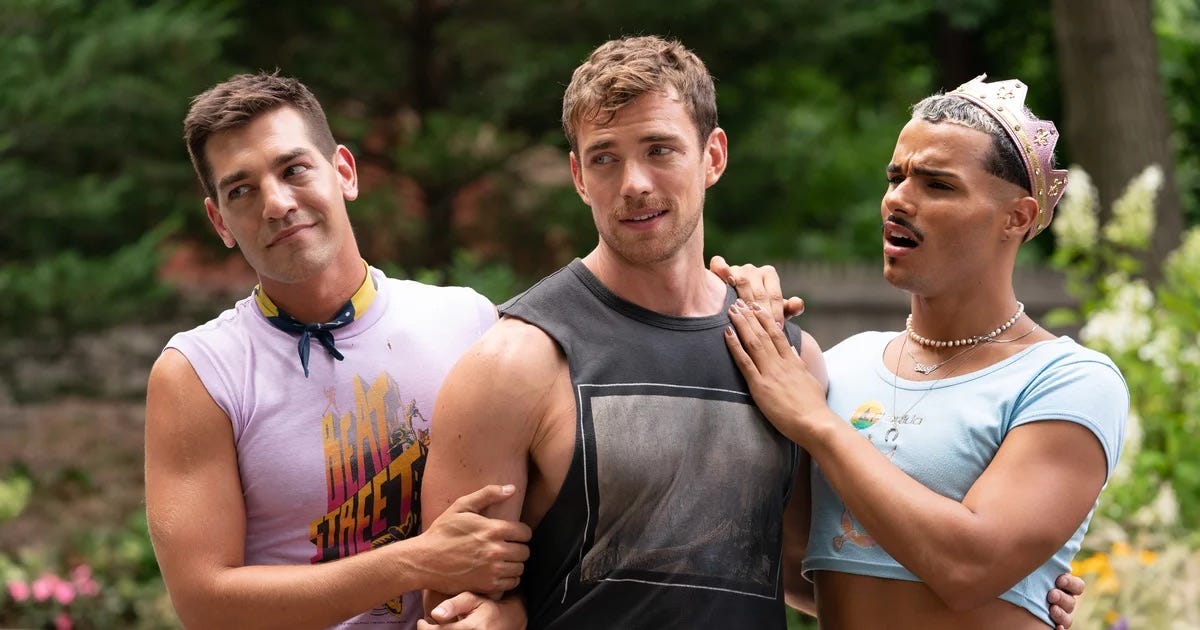How Matt Rogers in "Fire Island" Became the Lydia Bennett We've Always Needed
I wish that the cast and crew of “Fire Island” was in the larger awards conversation. I was ecstatic to see the casts’ Gotham Awards recognition and am equally excited for Joel Kim Booster who was nominated in the Best First Feature category of the Film Independent Spirit Awards. But it was vivacious and spirited performance of Matt Rogers that made me fall in love with this film.
“Fire Island” is not the first modern retelling of a Jane Austen novel. However, it adds nuance to one character that strengthens the story as a whole. If you have seen any previous adaption of Austen’s “Pride and Prejudice,” then you will know that Lydia Bennett is the worst Bennett sister. She is precocious, self-centered, and obnoxious. So, as I watched “Fire Island,” I was concerned about the Lydia character - and all of my trepidation was quickly squashed by Matt Rogers’ performance.
Rogers understood the two most important parts of Lydia: her close relationship with Kitty and her impulsive boldness. The Lydia-Kitty relationship is an important dynamic. While Elizabeth has Jane and Mary has books, the younger two Bennett sisters are glued at the hip. Rogers’ Luke is joined by Keegan (Tomás Matos). They have quick-witted banter. There has only been one scene that was immediately shared the moment the film dropped on Hulu. As the group of friends plays “Heads Up,” Will (Conrad Ricamora) struggles to guess “Marisa Tomei” as Luke and Keegan give ample clues. Watching Rogers (and Matos) give their all as Tomei in “My Cousin Vinny,” you can’t help but see that rich friendship come through in their performance. They are in-sync with each other. Angry that Will can guess Alicia Vikander but botches Tomei.
This pairing is critical, so when Luke/Lydia steps out on her own, you feel the absence. Which does lead to the other important aspect of Lydia Bennett: her impulsive boldness. It’s the character’s foolhardiness that brings both admiration and trepidation. In the original text - and subsequent adaptations - it is Lydia’s recklessness that gets her into trouble. Rogers brings that here, but does so in a more sophisticated and thought-out manner. Where Lydia is a very young woman, Luke is a man in his early 30s. He still possesses a joie de vivre without having it be his entire personality. Sure, he makes a fool of himself while drunk with Will’s friends, and goes off on an adventure that turns sour quickly. But Lydia’s impulsive nature is also wildly selfish. She acts on her own self-interest with little to no regard for others, especially her family. Luke does not fall into this trap. Instead, his impetuous nature is seen more as an inability to reign it in when partying, and not done to purposely hurt those around him.
And this, to me, demonstrates the stark difference between Lydia Bennett and the character Rogers brought to the film. Luke, while a partier, is also deeply loyal. While Keegan is his immediate confidant, he does show care to his other friends. More importantly, while Lydia bore the consequences of running away with George Wickham as a badge of honor, Luke’s experience is far more nuanced. After Luke returns to the group, it comes to light that not only was he spending time with hunk and bad boy Dex (Zane Phillips), but Dex secretly records him with Luke, posting their sex tape online without Luke’s consent.
Rogers brings so much to this turn because while the entire situation could be played off as a “consequence,” it is portrayed as a true violation of Luke. Sure, there is embarrassment and shame; we still victim-blame survivors of various forms of sexual violence. Luke also feels used, violated, and abused. All valid. Rogers is able to hold all of these emotions, giving them truth, without turning it into a joke. Rogers may have been quick-witted and comical throughout the film, but he understood the gravity of this moment. He adds layers to a normally one-note character. We, as an audience, can believe all of the complexity of his character. We can see Luke as both a gregarious member of his friend group and someone who survived an abusive encounter.
Being the Lydia of the group is not an easy task, but Rogers took the ambiguity left by lack of character development from the original text and crafted a character with nuance. Rogers held Luke’s vivacious spirit, his steadfastness for his friends, and vulnerability with ease, allowing these aspects to co-exist, sometimes simultaneously. “Pride and Prejudice” may not have given Lydia much to do, but Rogers was unstoppable in his performance. While I wish we were hearing Rogers’ name amongst the awards chatter, we can be grateful for his outstanding work.
“Fire Island” is available now on Hulu.





